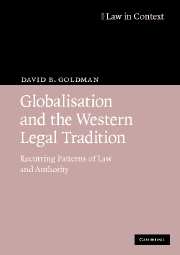Book contents
- Frontmatter
- Contents
- Preface
- 1 Introduction
- Part 1 Towards a Globalist Jurisprudence
- Part 2 A Holy Roman Empire
- Part 3 State Formation and Reformation
- Part 4 A Wholly Mammon Empire?
- 8 The constricted universalism of the nation-state
- 9 The incomplete authority of the nation-state
- 10 The return of universalist law: human rights and free trade
- Part 5 Competing Jurisdictions Case Studies
- Bibliography
- Index
10 - The return of universalist law: human rights and free trade
Published online by Cambridge University Press: 30 March 2010
- Frontmatter
- Contents
- Preface
- 1 Introduction
- Part 1 Towards a Globalist Jurisprudence
- Part 2 A Holy Roman Empire
- Part 3 State Formation and Reformation
- Part 4 A Wholly Mammon Empire?
- 8 The constricted universalism of the nation-state
- 9 The incomplete authority of the nation-state
- 10 The return of universalist law: human rights and free trade
- Part 5 Competing Jurisdictions Case Studies
- Bibliography
- Index
Summary
One culture's universal human rights can be another culture's universal poison. One person's universal free trade can be another person's unfair trade. One nation-state's tributes to human rights and free trade can be met with jeers of hypocrisy from onlookers. Welcome back to the twentieth century. This chapter considers the bequest of the World Revolution to the major discourses of authority supporting the Western legal tradition today.
At the beginning of the Western legal tradition, the European feudal economy was characterised by dispersed and local markets. Spirituality was for the most part centralised and universalist, under the ultimate reality and meaning extolled by the Catholic church. Today, this eleventh-century dynamic has been inverted. A global economy exists above dispersed spiritual, religious and belief communities. How those particular, dispersed communities and other political units relate to the claims to ultimate reality and meaning extolled by the universalist economy will probably be to future generations a large part of the conventional history of globalisation and law.
Globalisation and law cannot be understood without reference to the entire second millennium. The twentieth-century World Revolution constitutes at once the capstone of an old way of looking at law (which had culminated in state sovereignty) and the lodestar of a potentially globalist legal and ethical tradition coexisting with other legal and ethical traditions. Recurring patterns of Western law and authority are to be found in the pervasive historical tensions between these universalistic and particularistic tendencies.
- Type
- Chapter
- Information
- Globalisation and the Western Legal TraditionRecurring Patterns of Law and Authority, pp. 213 - 252Publisher: Cambridge University PressPrint publication year: 2008



